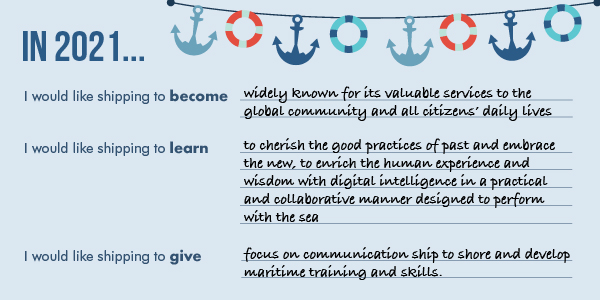This time of the year is always a good opportunity to consider lessons learned and set new year’s resolutions for a new start. Our special column Industry Voices: ‘Goodbye 2020, hello 2021’ aims to provide an overview of this challenging year and set new targets for 2021 to move forward.
In this context, we have asked Mrs. Athena Kanellatou, Regional Director Mediterranean, Middle East & India, MacGregor, to make an assessment of 2020 from her perspective and share her message for the new year across the global community. Among others, she highlights that shipping needs to cherish the good practices of past and embrace the new as well as to enrich the human experience and wisdom with digital intelligence in a practical and collaborative manner.
I would like shipping to give focus on communication ship to shore and develop maritime trainings and skills relevant to today’s environment and capabilities.
SAFETY4SEA: Focusing on your area of expertise, what were the most important industry development(s) within 2020?
Athena Kanellatou: Shipping Industry demonstrates exceptional resilience in a world of escalating complexity. Whilst travel restrictions and local containment actions limit the ability to be physically present, transparency in collaboration and communication from ship to shore have become increasingly key to effective maintenance planning and maximising operational availability. Proven technologies and digital solutions have been adopted at a faster pace to facilitate remote surveys and inspections, on line deals, webinars, training, daily interactions on shore and on board.
At MacGregor, we have seen an accelerated interest in, and uptake of, digitally-enabled services on remote technical support and advice to be provided in combination with comprehensive locally-based support. Converting our global extensive experience and knowledge into valuable benefits for the vessel and all stakeholders, MacGregor OnWatch Scout connects installed equipment to advanced monitoring systems offering condition and predictive maintenance, guidance to the crew, positive impact on safety, commercial and environmental performance. Technology is here to support more efficient, remote teams and operations facilitating faster and better-informed decisions.
S4S: Focusing on your area of expertise, what do you think that will be the biggest challenge(s) for the industry in 2021?
A.K.: International shipping faces increasing and demanding financial, technical and regulatory challenges. Safety, asset optimization, additional operating efficiencies and sustainability are key themes for the maritime industry in 2021. The objective is safe, reliable vessel operations and regulatory compliance. To respond to conventional concerns and new challenges with a holistic and responsible approach, respect to good seamanship and tested practices while at the same time explore the potential of digitally enabled services, connect assets and turn data into powerful insights for action.
S4S: What would be the 2021 resolutions for your company/organisation?
A.K.: MacGregor integrated the legacy MacGregor and former TTS; with the passion to make maritime material and cargo flow safer, more sustainable and more efficient, to expand our expertise within the offshore wind energy environment, empower our global services network and extensive customer support capabilities. We stand by our customers being at the forefront and applying our cumulative expertise to their advantage. MacGregor services are enriched by digital enabled solutions like OnWatch scout, focusing on maximising the operational availability and performance, moving support from a reactive to proactive mode. We encourage trustful relationships, co creation and collaboration in the industry, communication ship to shore, focused on safety and efficiency.
S4S: What is your overall forecast for shipping industry in 2021 and what would you like to share and/or wish and/or ask other industry stakeholders?
A.K.: Maritime industry has a strong survival instinct and knows best how to thrive in harsh conditions for ages. The human factor is the most important for the management of the ship, with resilience, wisdom and familiarity with technological capabilities to handle new challenges. What is considered excellent today will only be considered as merely adequate tomorrow. There is a continual improvement loop, feeding back learnings and using creativity and innovation to drive increased value for all stakeholders.

The views presented hereabove are only those of the author and do not necessarily those of SAFETY4SEA and are for information sharing and discussion purposes only.




























































